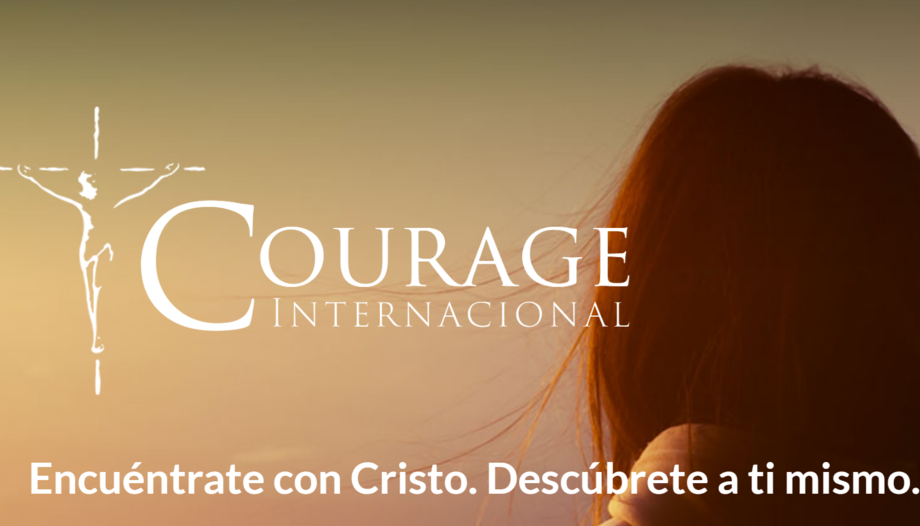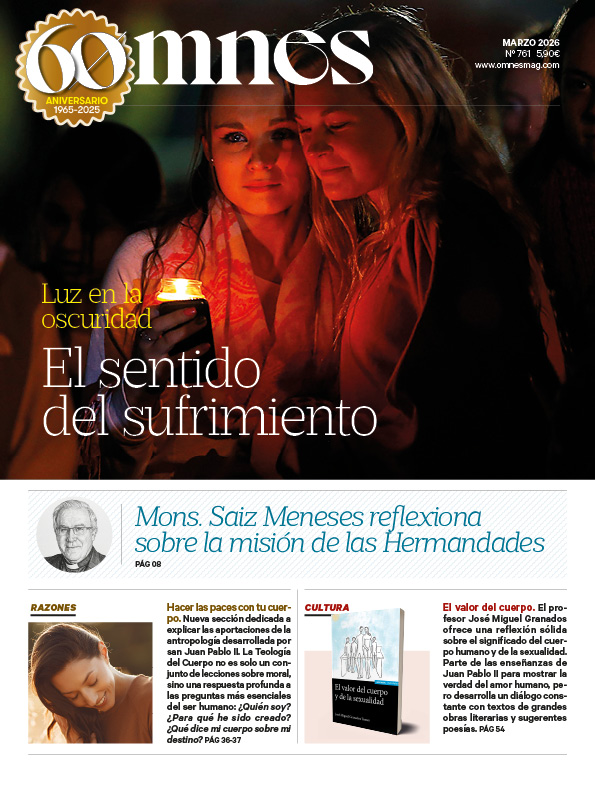The apostolate of "Courage International"Courage is a spiritual and pastoral accompaniment for people who experience same-sex attractions. The Courage team wants to remember that the most important thing about everyone is our dignity as children of God, which is not lost according to our sexual tendencies.
The entire apostolate of this group is based on the Holy Scriptures and the Gospel. They live welcoming everyone "with love and mercy, as Jesus would do". They talk about this in this interview, in which they deal with topics such as chastity, friendship and feelings of guilt.
What does the work of "Courage" consist of?
- The work of the "Courage International" apostolate - founded in 1980 and now present in more than 20 countries - consists in the spiritual and pastoral accompaniment of men and women who experience same-sex attraction. These people have freely decided to live a life of chastity according to the teachings of the Catholic Church.
Members of the apostolate meet regularly in chapters (groups) led by a chaplain-a priest or permanent deacon appointed by their local bishop-who guides them spiritually based on the Five Goals of Courage. In summary, these goals invite and encourage Courage members to deepen their understanding and living of the virtue of chastity; to have a strong spiritual and sacramental life; to build a spirit of brotherhood among members so that they may help one another; to forge chaste friendships recognizing the blessing they signify in the Christian life; and to have their lives be a witness to others.
What is chastity and how can we commit to living it in a hyper-sexualized world?
- The virtue of chastity, as the Catechism explains, is "the achieved integration of the sexuality in the person and thus in the inner unity of man in his bodily and spiritual being". Regardless of his state in life - single, married, priestly or consecrated - every baptized person is called to live chastity. This virtue purifies the soul and body in an integral way according to the nature and vocation of each person for a total gift of self.
Our commitment to live chastity should arise from the recognition of our own dignity as beloved children of God, made in his image and likeness. Certainly, living chastity has always been demanding and even more so today, given the hypersexualized and hedonistic social climate in which we live. However, it is possible to live chastity with God's grace and a solid spiritual life.
With regard to the latter, the Church proposes various means to help us live chastity. Among them are: the sacramental life, prayer, order and asceticism according to one's state in life, the living of the moral virtues, especially temperance (a virtue that puts the passions under the control of reason), and self-knowledge (Catechism of the Catholic Church, n. 2337) . It is essential for each person to know himself in the light of God's plan. Since it is "Christ who reveals the man to the man himself" (Gaudium et spes(n. 22) that personal knowledge is only fully possible through an encounter with Christ, the model of our own humanity. It is he who speaks to our heart and soul and urges us to be light in the midst of the world.
Apart from spiritual work, this commitment to living chastity also requires a purification of the culture and social climate. (Catechism of the Catholic Churchn. 2525) that must begin in marriage and in the family itself. If one does not know about sexuality, it is difficult to understand the virtue of chastity and the freedom that living it brings. Unfortunately, it is a topic that is still taboo in the home. If parents do not discuss it in time with their children, they will look elsewhere for answers. Developments in communications have facilitated access to other immediate "answers" that are often not only incorrect, but contrary to natural law and faith.
After the home, it is important to address the issue in ecclesial environments, so that the experience of chastity will not only be better understood, but also more bearable. Sometimes it is thought to be a repression of feelings or desires, when in fact it is the opposite. Chastity allows the fullness of love in freedom, in the integrity of the human person.
In Courage you talk a lot about friendship, how important is it in the life of Christians?
- The virtue of friendship, which is "a direct requirement of human and Christian fraternity". (Catechism of the Catholic Church(b. 1939), plays a very important role in the life of a Christian. Friendship unites two or more people as they strive to achieve a common interest or goal, including the desire to attain holiness together and to grow in their relationship with Christ, who said to his apostles, "I call you friends" (Jn 15:15). Christ calls his friends to form one Body with him and with each other, so that the clearest sign of one's love for God is the extent to which he loves his neighbor (cf. 1 John 4:20-21).
In our apostolate we talk a lot about friendship because we know, as the Church teaches us, that "chastity develops in friendship". (Catechism of the Catholic Church, n. 2347). As Fr. Philip Bochanski, who until a few weeks ago was executive director of Courage International, used to say, "Friendship is not a consolation prize, not a 'second-class love,' but a real bond, the foundation of every authentic relationship." Jesus himself taught us to cultivate these human relationships and we see it throughout the Gospels. As Sirach tells us, "a faithful friend is a sure refuge, he who finds him has found a treasure" (Sirach 6:14).
How can families help and support their LGBT loved ones?
- In the Church, families have the wonderful mission of accompanying their loved ones and helping them, little by little, to come to an encounter with Jesus Christ, always welcoming them with charity and truth.
The first thing I recommend to those who have just learned that a family member or loved one identifies as LGBT is not to be alarmed. I recommend that you listen to the person and try, even if it is difficult, to understand the particular moment they are going through. It is very important that you express your unconditional love for him/her and help him/her little by little to rediscover his/her deepest identity as a child of God. May they walk with their loved one towards the encounter with the Heart of Jesus. There they can find that Love and freedom that we all seek.
It is not always prudent to begin this accompaniment by explaining everything the Catechism says on the subject. It all depends on their situation, their faith life and the moment they are living. Families should consider all this when helping their loved ones.
After this first big step, in order to be able to accompany in the best way, besides having an active spiritual life, it is very necessary that the family members be formed with the teachings of the Church on this subject. Our experience in this pastoral is that there is a lot of ignorance and ignorance on the subject. It is urgent and necessary that they be formed in the teachings of the Church in the light of the Holy Spirit. This will help them to love with greater freedom and to know and live the Truth not only in what refers to same sex attraction, but in everything that concerns the human person, always with charity, patience and gentleness.
It is essential that they pray, not only for their family member, but also for themselves. May they pray to be faithful instruments of God's love in their families, aware that the salvation of their children is not in their own hands, but in God's hands. Prayer also disposes the hearts of parents to trust in the Lord and respect the freedom and processes of their children, who, in due time, will listen to the voice of God in their hearts. The life of prayer allows parents to recognize that they are not in control of their children's lives, thus opening themselves to the overwhelming power of grace.
I also invite you to entrust yourselves to the intercession of Mary Most Holy, St. Monica and St. Augustine. Finally, if possible, I recommend that you seek a priest or spiritual director to accompany you spiritually on this journey.
It seems that today we tend to focus on people's sexuality and tendencies. How do we avoid defining people solely by their sexual tendencies?
- Indeed, people today are increasingly defined by their sexual or affective attractions. However, a person's humanity encompasses much more than his or her sexual desires. The Church views the person in light of his or her identity as a child of God, created good, free and in God's image and likeness.
Consequently, the Church tells us that the person "cannot be adequately defined by a reductive reference only to his or her sexual orientation" (Congregation for the Doctrine of the Faith, "Letter to the Bishops of the Catholic Church on the Pastoral Care of Homosexual Persons" (1986), no. 15). As Pope Francis once stated, "Persons should not be defined solely on the basis of their sexual tendencies." Therefore, in order to avoid reducing people to their sexual tendencies, we must always keep in mind their dignity as children of God.
At Courage Apostolate, we do not refer to our members as "gay" or "LGBTQ". These terms could give the impression that same-sex attractions define a separate type or category of person with different morals. Rather, we refer to them as our brothers and sisters, men and women, who experience same-sex attraction.
From the beginning God has revealed to man his identity: "Male and female he created them"! Our whole being speaks of who we are, beginning with each of our cells, down to the most obvious differences in our bodies. We must strive to use the right language to be able to express the full dignity of the human person and not remain in only one aspect.
Conversations about sexual proclivities and LGBT are highly polarized.. Is it possible to discuss this without falling into radical or ideological positions?
- Of course, because we are talking about the human person. This dialogue is possible when we know with clarity the teachings of the Church and when we have an intimate relationship with Jesus Christ, Truth itself. It is of no use to know the truths of our faith, if they are not incarnated in our lives to share them with deep charity as Jesus did. And certainly living what Jesus himself taught us is the most liberating for the human heart, and demanding.
As Jesus explains in the Gospel, in the world we must be "shrewd as serpents and innocent as doves" (Mt 10:16). It is important to know how to discern in the light of the Holy Spirit whether it is the right time, the right situation or the right place to engage in this dialogue. It is a subject that touches very sensitive and deep fibers of the human being, in many cases, also wounds of the heart. Therefore, it is essential to be aware that we are entering sacred ground. This is how to begin a dialogue on the subject: with charity and truth. If both are not present, it is better to leave it for another time.
Enlightened by the truth of Scripture and the Magisterium, and inflamed with the love of Christ in our hearts, we will be able to engage in these dialogues with "the Jesus method," as one of our Courage members calls it.
How does Courage help people recover from feelings of guilt and unworthiness after offenses against chastity?
- Welcoming them with love and mercy, as Jesus would do. Letting them know that God loves them infinitely, that they are much more than their falls and sins, that they are -once again- beloved children of God. That the Lord, in his infinite mercy always forgives them whenever they repent, because he knows their heart. The spiritual fatherhood of the chaplain of "Courage" is an invaluable benefit for the members of the local chapters. In the chaplain they find the loving welcome and pastoral accompaniment that the Church offers her children.
As Pope Francis said, "we must always consider the person. Here we enter into the mystery of the human being. In life, God accompanies people and we must accompany them starting from their situation. It is necessary to accompany them with mercy. When that happens, the Holy Spirit inspires the priest to say the right words" (Pope Francis, quoted by Antonio Spadaro, "A Big Heart Open to God," America 209:8, September 30, 2013).
The good that priests can do in the confessional is a gift given by God from on high and a treasure in the Church. We invite all priests to show the love and mercy of the Heart of Jesus to those who come to their confessionals in repentance. Do not fail to speak to them with the Truth that liberates the soul and with the mercy that embraces the human heart. Be truly other Christs and act as the Lord did with the sinful woman: "Neither do I condemn you; go, and from now on sin no more" (Jn 8:11).









